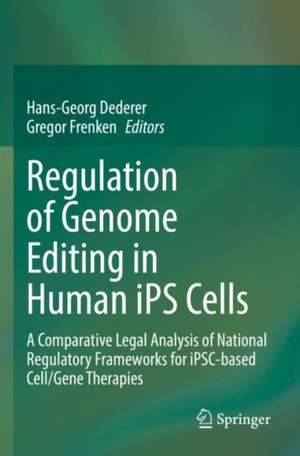Regulation of Genome Editing in Human iPS Cells: A Comparative Legal Analysis of National Regulatory Frameworks for iPSC-based Cell/Gene Therapies
Editat de Hans-Georg Dederer, Gregor Frenkenen Limba Engleză Paperback – 25 mai 2023
The book provides a concise overview of currently applicable regulatory frameworks of states which are among the world leaders in research and development (R&D) of cell and gene therapies. Developments in genome editing are expected to lead to new possibilities for the treatment of hereditary diseases in humans. The treatment of such often severe but hitherto uncurable diseases can be based on genome-edited induced pluripotent stem cells (iPS cells). Such treatments constitute combined cell/gene therapies. These therapies need to be governed by a regulatory framework which ensures quality, safety, and efficacy of the relevant therapeutic products. On the other hand, such regulations may retard product approval and impede R&D. Accordingly, national regulations for therapies based on genome-edited iPS cells are an important and, as the case may be, decisive factor for both researchers and industry regarding their decision where to locate their R&D activities. Therefore, regulatory frameworks impact significantly on the competitiveness of states and their economies. This is why a comparative analysis of laws and regulations of different countries matters. Such a comparative legal analysis provides an important insight into regulatory concepts which, in turn, may inspire adjustments of, or amendments to, domestic legal regimes. For this purpose, experts present country reports on France, Germany, Japan, South Korea, Switzerland, and the USA. The reports on France and Germany also refer to the parameters and implications arising from pertinent EU law. This contributed volume is aimed at researchers, but also at, e.g., legal scholars, lawmakers, regulators, and political decision makers.
| Toate formatele și edițiile | Preț | Express |
|---|---|---|
| Paperback (1) | 946.87 lei 6-8 săpt. | |
| Springer International Publishing – 25 mai 2023 | 946.87 lei 6-8 săpt. | |
| Hardback (1) | 952.89 lei 6-8 săpt. | |
| Springer International Publishing – 24 mai 2022 | 952.89 lei 6-8 săpt. |
Preț: 946.87 lei
Preț vechi: 1154.72 lei
-18% Nou
Puncte Express: 1420
Preț estimativ în valută:
181.20€ • 188.94$ • 150.60£
181.20€ • 188.94$ • 150.60£
Carte tipărită la comandă
Livrare economică 21 martie-04 aprilie
Preluare comenzi: 021 569.72.76
Specificații
ISBN-13: 9783030930257
ISBN-10: 3030930254
Ilustrații: X, 334 p. 13 illus., 10 illus. in color.
Dimensiuni: 155 x 235 mm
Greutate: 0.49 kg
Ediția:1st ed. 2022
Editura: Springer International Publishing
Colecția Springer
Locul publicării:Cham, Switzerland
ISBN-10: 3030930254
Ilustrații: X, 334 p. 13 illus., 10 illus. in color.
Dimensiuni: 155 x 235 mm
Greutate: 0.49 kg
Ediția:1st ed. 2022
Editura: Springer International Publishing
Colecția Springer
Locul publicării:Cham, Switzerland
Cuprins
Introduction.- Biological Aspects of Genome Editing in iPS Cells.- Ethical Aspects in the Context of Genome Editing.- Regulation of Genome Editing in iPS Cells: Germany.- Regulation of Genome Editing in iPS Cells: France.- Regulation of Genome Editing in iPS Cells: Switzerland.- Regulation of Genome Editing in iPS Cells: United States.- Regulation of Genome Editing in iPS Cells: Japan.- Regulation of Genome Editing in iPS Cells: Republic of Korea.- Comparative Analysis.
Notă biografică
Hans-Georg Dederer is a full professor and holder of the Chair of Constitutional and Administrative Law, Public International Law, European and International Economic Law at the University of Passau (Germany). His fields of research include biotechnology law. He is also a member of the Permanent Senate Commission on Genetic Research of the German Research Foundation (Deutsche Forschungsgemeinschaft – DFG).
Gregor Frenken is a teaching and research assistant in the Chair of Constitutional and Administrative Law, Public International Law, European and International Economic Law at the University of Passau (Germany).
Gregor Frenken is a teaching and research assistant in the Chair of Constitutional and Administrative Law, Public International Law, European and International Economic Law at the University of Passau (Germany).
Textul de pe ultima copertă
The book provides a concise overview of currently applicable regulatory frameworks of states which are among the world leaders in research and development (R&D) of cell and gene therapies. Developments in genome editing are expected to lead to new possibilities for the treatment of hereditary diseases in humans. The treatment of such often severe but hitherto uncurable diseases can be based on genome-edited induced pluripotent stem cells (iPS cells). Such treatments constitute combined cell/gene therapies. These therapies need to be governed by a regulatory framework which ensures quality, safety, and efficacy of the relevant therapeutic products. On the other hand, such regulations may retard product approval and impede R&D. Accordingly, national regulations for therapies based on genome-edited iPS cells are an important and, as the case may be, decisive factor for both researchers and industry regarding their decision where to locate their R&D activities. Therefore, regulatory frameworks impact significantly on the competitiveness of states and their economies. This is why a comparative analysis of laws and regulations of different countries matters. Such a comparative legal analysis provides an important insight into regulatory concepts which, in turn, may inspire adjustments of, or amendments to, domestic legal regimes. For this purpose, experts present country reports on France, Germany, Japan, South Korea, Switzerland, and the USA. The reports on France and Germany also refer to the parameters and implications arising from pertinent EU law. This contributed volume is aimed at researchers, but also at, e.g., legal scholars, lawmakers, regulators, and political decision makers.
Caracteristici
Identifies pros and cons so as to provide advice to lawmakers and regulators Analysis of the legal frameworks which provides insight into regulatory concepts Scientific introduction into iPS cell technology and genome editing of iPS cells
